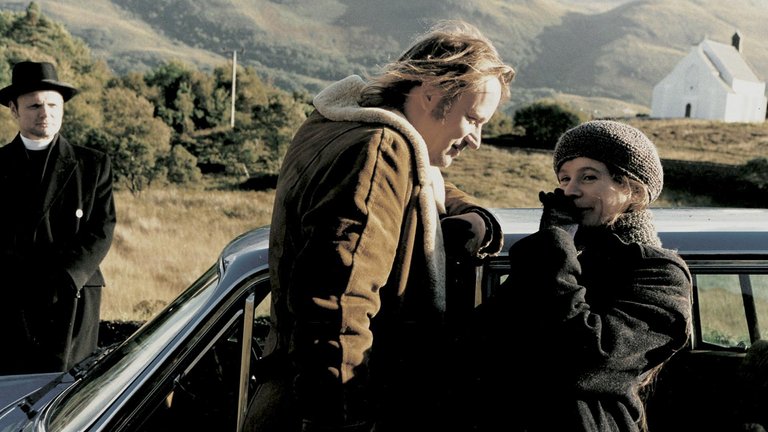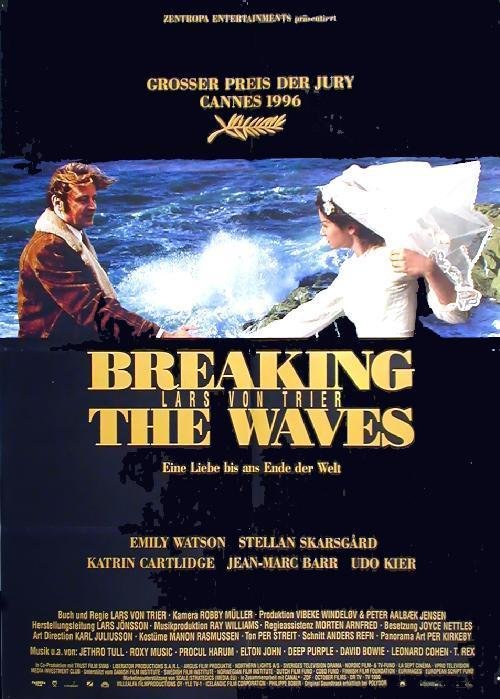
Lars von Trier's films are weird. It's true that I've only seen three of his films (including this one) but they have been unconventional stories, in substance and form, at the height of that cult film label that often identifies them; And it couldn't be different for a director who mixes drama, romance, psychological thriller, science fiction, religion, fantasy, rural life, eroticism, among other things and who - for example - has a series of films called Trilogy of the Depression.
Las películas de Lars von Trier son películas raras. Es cierto que apenas he visto tres cintas suyas (contando esta) pero han sido historias poco convencionales, en fondo y forma, a la altura de esa etiqueta de película de culto que muchas veces las identifican; y es que no podía ser diferente tratándose de un director que mezcla drama, romance, thriller psicológico, ciencia ficción, religión, fantasía, vida rural, erotismo, entre otras cosas y que - por ejemplo - tiene una serie de películas llamadas Trilogía de la Depresión.
And within that filmography, perhaps Breaking the Waves is his best film. It's a psychological and erotic drama set in Scotland in the early 1970s. It tells the story of Bess (masterfully played by Emily Watson), a naive and innocent young woman who lives in a small, rather hermetic and conservative town in which religion is a fundamental pillar of social life. Despite the warnings and the possible difficulties it may entail, Bess falls in love and marries Jan (a young and handsome Stellan Skarsgård), a man who is not from the town (the locals have a hard time accepting outsiders). and who works on an oil platform at sea. However, because Bess is well liked in the community and is a collaborator in the church, they allow her to marry him. The first days after the wedding are a real honeymoon. Jan and Bess spend the whole day together and she - who remained a virgin until marriage - discovers sexual pleasure at the hands of her husband. Bess wants to be with Jan all day and when he has to go back to work on the platform, she has a hard time. Bess is extremely sensitive, quite naive, has a psychiatric history and is also very devout, which is why she seeks comfort, advice and guidance in God, going to pray at church. And God answers her.
Y dentro de esa filmografía, acaso Breaking the Waves sea su mejor película. Se trata de un drama psicológico y erótico que se ambienta en Escocia a principios de los años setenta. En ella se cuenta la historia de Bess (interpretada magistralmente por Emily Watson), una joven ingenua e inocente que vive en un pequeño pueblo bastante hermético y conservador en el que la religión es un pilar fundamental de la vida social. A pesar de las advertencias y de las posibles dificultades que puede significar, Bess se enamora y se casa con Jan (un joven y apuesto Stellan Skarsgård), un hombre que no es del pueblo (a los locales les cuesta aceptar a los de afuera) y que trabaja en una plataforma petrolífera en el mar. Sin embargo, porque Bess es muy apreciada en la comunidad y es colaboradora en la iglesia, le permiten casarse con él. Los primeros días después de la boda son una verdadera luna de miel. Jan y Bess pasan todo el día juntos y ella - que se mantuvo virgen hasta el matrimonio - descubre el placer sexual de la mano de su esposo. Bess quiere estar todo el día con Jan y cuando éste debe volver a trabajar en la plataforma, ella lo pasa mal. Bess es sensible en extremo, bastante ingenua, tiene antecedentes psiquiátricos y también es muy devota, razón por la cual busca consuelo, consejo y orientación en Dios, yendo a orar a la iglesia. Y Dios le responde.

Whether these responses from divinity are real or a product of Bess's imagination (psychosis?) is for the viewer to judge. But in any case, the scenes in which Bess speaks to the sky in a submissive tone, with her gaze raised and then answers herself by looking down, with a different tone and with a wisdom greater than herself, are some of the most interesting things that the film has. Emily Watson's performance is wonderful.
Si esas respuestas de la divinidad son reales o son producto de la imaginación de Bess (¿psicosis?), eso que lo juzgue el espectador. Pero en cualquier caso, las escenas en las que Bess habla al cielo en un tono sumiso, con la mirada alzada y luego se contesta mirando hacia abajo, con otro tono y con una sabiduría más grande que ella misma, son de las cosas más interesantes que tiene el film. La actuación de Emily Watson es maravillosa.
One day that connection that Bess feels she has with God is shaken and sharpened by a tragic incident (accident? coincidence?). Because she misses her husband so much, Bess asks God to send him home and then, after suffering an accident at work, Jan returns home on a stretcher... he has been paralyzed. Bess believes it's her fault, but Jan only asks her to live her life, not to condemn herself to living next to a man who cannot satisfy her and who will no longer be able to do so, so he asks her to sleep with other men. At first Bess feels very bad, she does not understand her husband's request. For her, there is no other man than Jan and the love she feels for him and to which she feels devoted - in addition to her personality, her way of thinking and her emotional sensitivity - raises serious doubts as to whether or not that is the best. In the end, she gives in. Out of love for Jan, she will do what he asks, but from there Bess will enter a dizzying psychological, emotional and physical spiral that will take her to unsuspected extremes for her and for everyone in the town where there will be no shortage of rumors, condemnation and disapproving looks. Bess's story is dramatic, tragic and although it seems unbelievable that someone could live like this, at the same time it is quite plausible. Bess is a character who suffers, cries, laughs, loves, despairs, screams, faints, prays, feels guilt, regret, devotion... she is a character who is alive, isn't that what we want to feel when we see a movie?
Un día esa conexión que Bess siente tener con Dios se ve sacudida y agudizada por un trágico incidente (¿accidente? ¿casualidad?). Porque extraña muchísimo a su esposo, Bess le pide a Dios que lo envíe a casa y entonces, tras sufrir un accidente laboral, Jan vuelve a casa en una camilla... ha quedado paralítico. Bess cree que es su culpa, pero Jan sólo le pide que viva su vida, que no se condene a vivir al lado de un hombre que no puede satisfacerla y que ya no podrá hacerlo, así que le pide que se acueste con otros hombres. Al principio Bess se siente muy mal, no entiende la petición de su esposo. Para ella no existe otro hombre que Jan y el amor que siente por él y al que se siente consagrada - además de su personalidad, su forma de pensar y su sensibilidad eomcional - le plantea serias dudas de si eso es, o no, lo mejor. Al final, cede. Por amor a Jan, hará lo que él le pide, pero a partir de allí Bess ingresará en una vertiginosa espiral psicológica, emocional y física que la llevará a extremos insospechados para ella y para todos en el pueblo en donde no faltarán los rumores, la condena y las miradas reprobatorias. La historia de Bess es dramática, trágica y aunque parece mentira que alguien pueda vivir así, a la vez es bastante verosímil. Bess es un personaje que sufre, llora, ríe, ama, que se desespera, grita, se desmaya, ora, siente culpa, arrepentimiento, devoción... es un personaje que está vivo, ¿no es eso lo que queremos sentir cuando vemos una película?

Although it seems that I have already advanced a lot of the plot, the truth is that there are many more things that happen in Breaking the Waves, a film that mixes different genres and aspects to configure a story different from most - it which is already enough to be grateful for - but which also manages to do it in a great way, with a solid script, beautiful photography and sublime performances, especially that of Emily Watson as Bess.
Aunque parezca que ya adelanté mucho de la trama, la verdad es que son muchas más las cosas que ocurren en Breaking the Waves, una película que mezcla diferentes géneros y aspectos para configurar una historia diferente a la mayoría - lo que ya es suficiente como para agradecer - pero que además consigue hacerlo de gran forma, con un guión sólido, una fotografía hermosa y unas actuaciones sublimes, en especial la de Emily Watson como Bess.
Does God exist? And if so, does he listen to us? and if he listens to us, are we pleased? Or does he always do what he wants, what he thinks is best for us? What does it mean to love? What do we talk about when we talk about love? (I accidentally quoted the title of a story book by Raymond Carver) What does love encompass? the mind, the soul or the body? Can you not love unless you give yourself all three? If a person - as in Jan's case - cannot please his or her partner sexually, is love over? or does it still exist? The request he makes to Bess - that she sleep with other men - is he making it out of love? from wounded pride? Does he do it for her, because he loves her? Or does he do it for himself, because he feels guilty for stealing the life of the woman he loves? There are so many questions that this story poses and so many moral, religious, personal and emotional dilemmas that it presents to us that it's impossible to come out of Breaking the Waves unscathed. This, perhaps Lars Von Trier's best film, is a film that you may or may not like, but it will not leave you indifferent. Some will enjoy it, others will cry with it, some will be upset with a character or the script, but everyone will feel the emotional shock that this film represents and isn't that the purpose of art, to stir our interior and make us feel? Have any of you seen this movie? what did you think? What is your favorite from the Danish director? I read you in the comments.
¿Dios existe? y si es así, ¿nos escucha? y si nos escucha, ¿nos complace? ¿o hace siempre lo que quiere, lo que cree que es mejor para nosotros? ¿qué significa amar? ¿de qué hablamos cuado hablamos de amor? (sin querer cité el título de un libro de cuentos de Raymond Carver) ¿qué abarca el amor? ¿la mente, el alma o el cuerpo? ¿no se puede amar a menos que se entreguen las tres cosas? Si una persona - como en el caso de Jan - no puede complacer sexualmente a su pareja, ¿se acabó el amor? ¿o sigue existiendo? La petición que le hace a Bess - que se acueste con otros hombres - ¿la hace desde el amor? ¿desde el orgullo herido? ¿lo hace por ella, porque la ama? ¿o lo hace por él, porque siente la culpa de estar robándole la vida a la mujer que ama? Son tantas las preguntas que nos plantea esta historia y tantos los dilemas morales, religiosos personales y emocionales que nos presenta que es imposible salir indemne de Breaking the Waves. Esta, tal vez la mejor película de Lars Von Trier, es una película que puede gustarte, o no, pero no te dejará indiferente. Algunos la disfrutarán, otros llorarán con ella, algunos se molestarán con algún personaje o con el guión, pero todos sentirán la sacudida emocional que representa este film y ¿acaso no es esa la finalidad del arte, remover nuestro interior y hacernos sentir? ¿alguno de ustedes ha visto esta película? ¿qué les pareció? ¿cuál es su favorita del director danés? Los leo en los comentarios.





